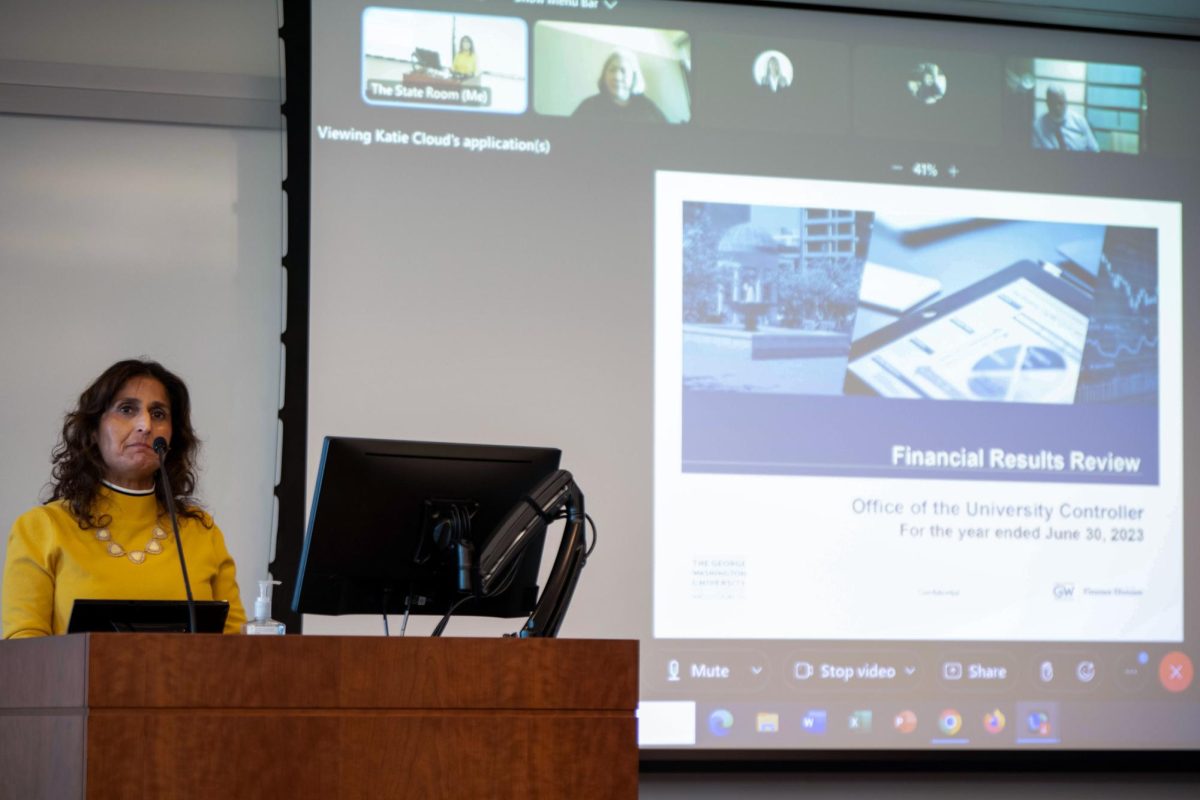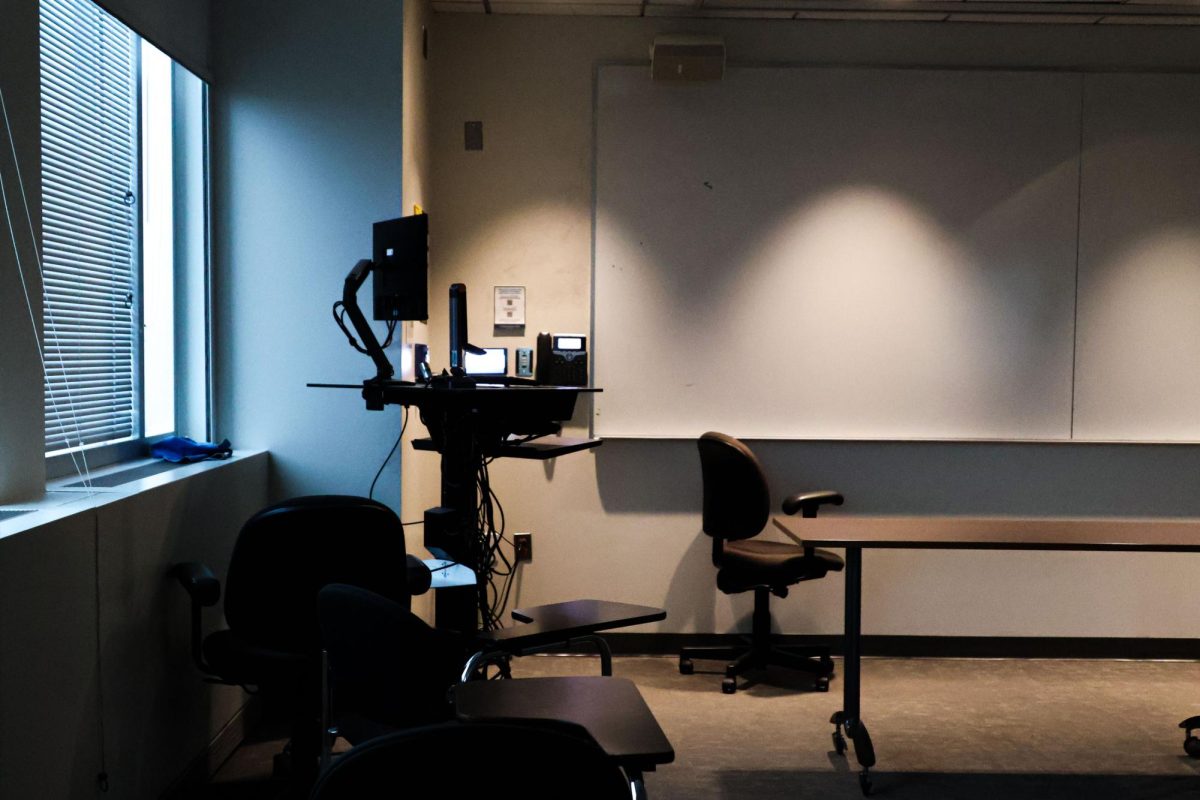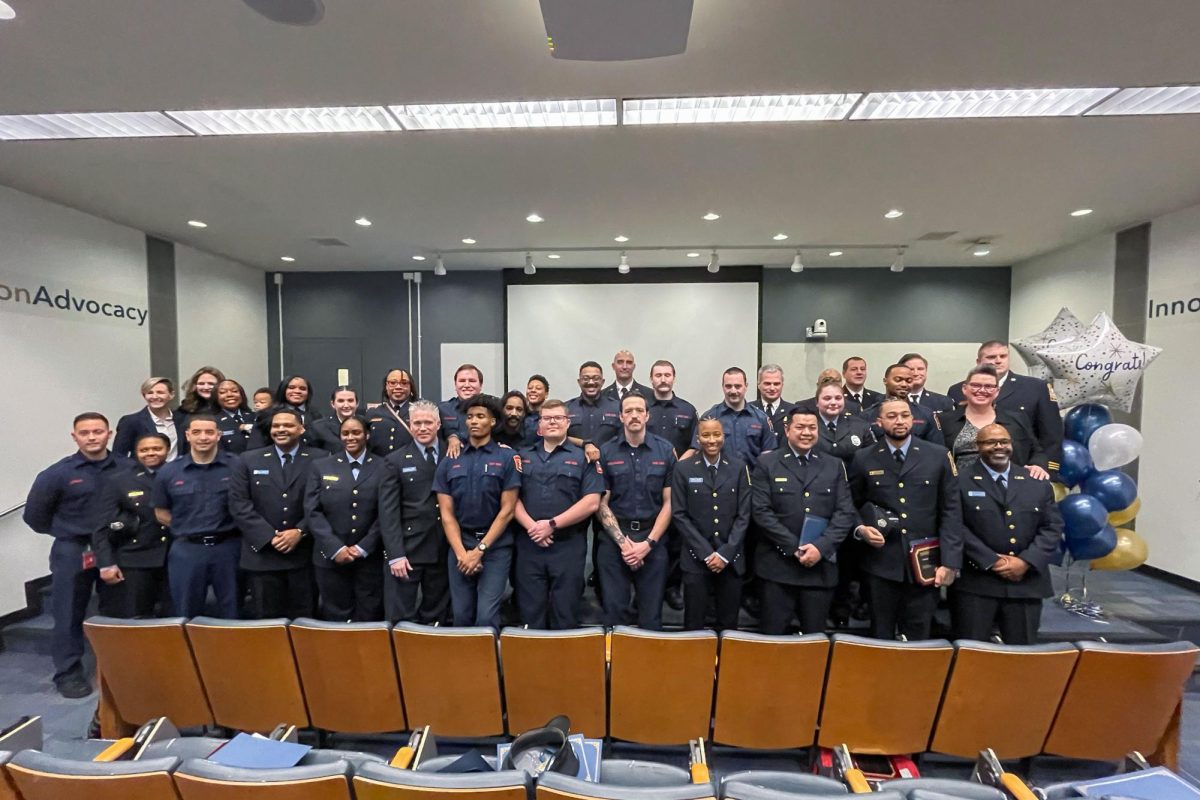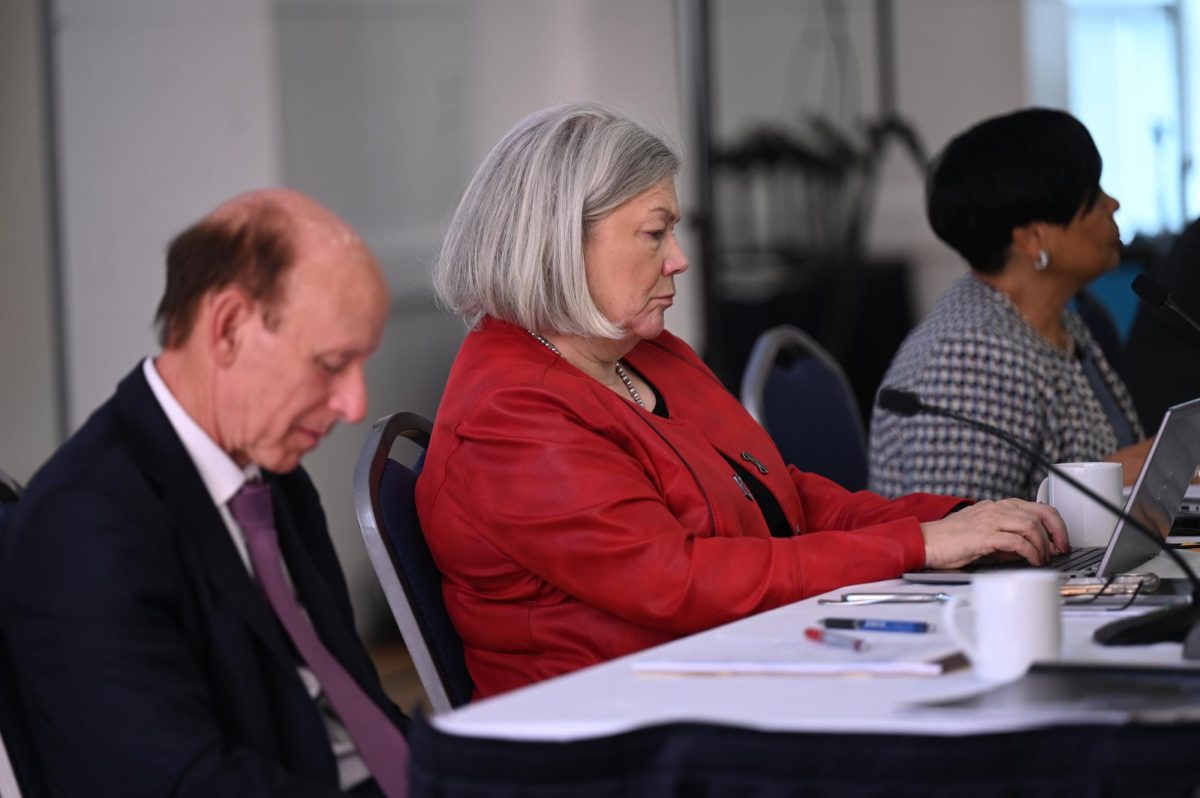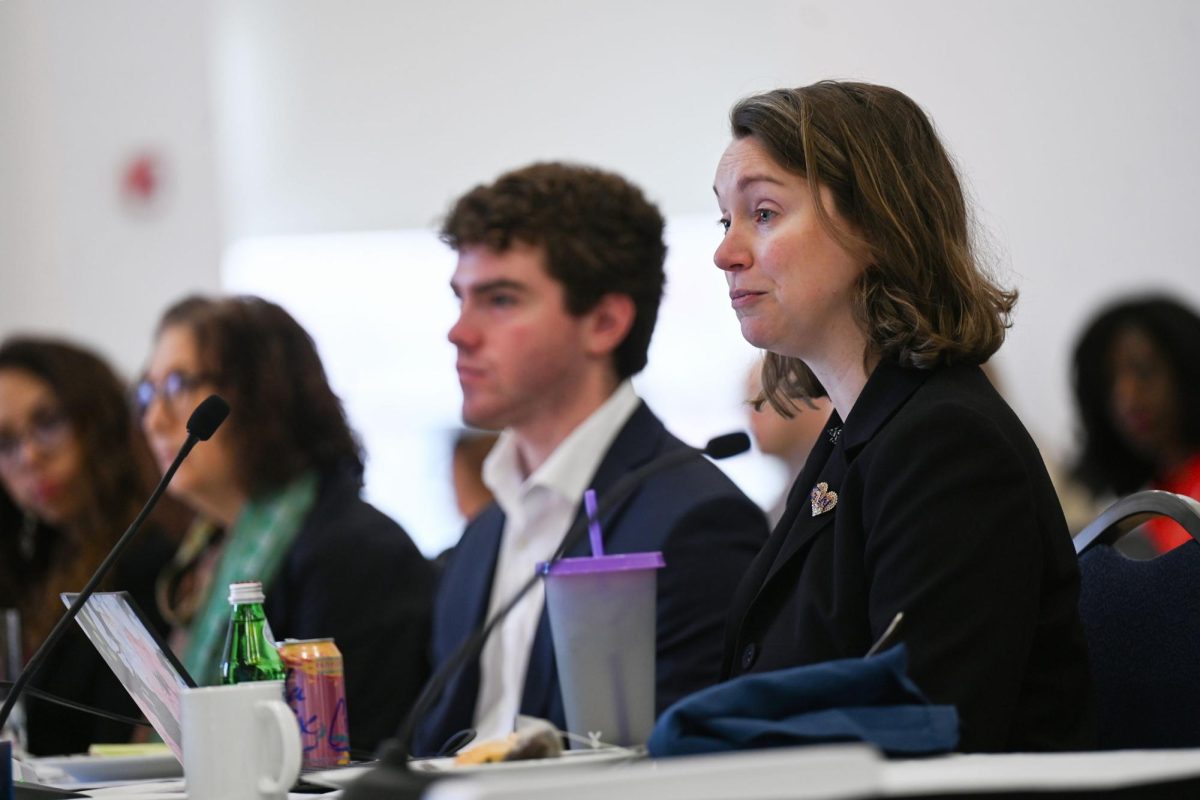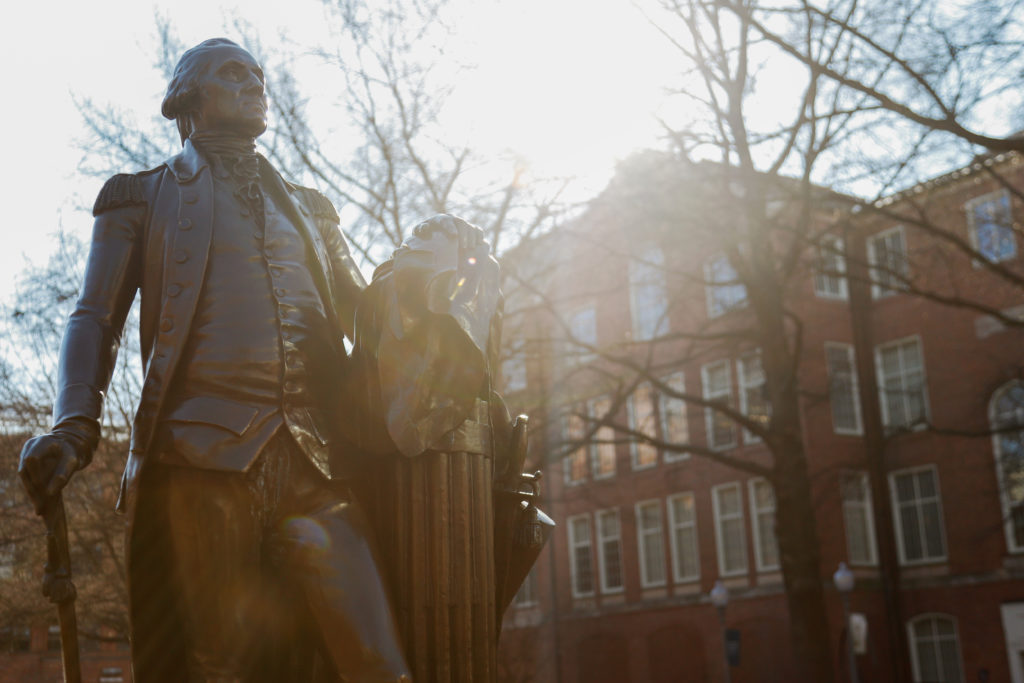Associate Vice President and University Controller Neena Ali said GW’s $5 billion in assets indicate a “strong” financial performance and liquidity in fiscal year 2023 at a Faculty Senate meeting Friday.
Ali said GW had $5 billion in total assets in fiscal year 2023 — $24 million more than in FY 22 — which allows officials to cash in some of its investments in the event of an emergency. She said GW is a “tuition-dependent University” because tuition revenue made up 57 percent of GW’s operating revenue in FY 23, with patient care and investments comprising the remaining 43 percent, and auxiliary revenue increased by $19 million due to additions last academic year like GW’s new dining plans.
The report also included new commitments reported by the Division of Development, including that the University received about $20 million less in “bequest intentions” in FY 23 and received $402,000 less in “Hillel gifts.” The report also stated that GW received more than $21 million less in “grants for sponsored projects.”
“We only recognize the money when we receive it because donors can always change their mind,” Ali said at the meeting.
She said GW had $2.8 billion in investments, largely made up of the University’s endowment, a financial foundation used to fund professorships, scholarships and construction projects largely from donations. She said the endowment market performed well and experienced a 9.9 percent increase in FY 23, surpassing the 8.8 percent benchmark.
She said the World Bank building is no longer an option for investments but the University now owns the building, which they can earn $7 million in rental income from. Officials purchased 600 19th St. NW from the World Bank in December 2022 for $11.5 million.
Ali said she did not plan to discuss the Medical Faculty Associates, a group of physicians that teaches at the School of Medicine and Health Sciences, but she said she is “sure” that the MFA will be able to pay back their debt to the University. The MFA has accumulated about $200 million in debt to the University and lost $80 million in FY 23 and FY 22.
Data attached to the meeting agenda showed the MFA’s expenses exceeded its revenue by $27 million in the first quarter of FY 24, according to the update by the senate’s Fiscal Planning and Budgeting Committee. The data was not discussed at the meeting.
The update states that the MFA made $90.7 million in revenue in the first quarter of FY 24. Net patient service revenue decreased from $54.4 million in FY 23 Q4 to $53.5 million in FY 24 Q1 due to high provider turnover, according to the update.
The results state that the MFA experienced “unrealized” gains and losses from investments related to the sale-leaseback of 2300 M St. NW — an MFA building that officials put up for sale in November 2022 with the intent of signing a long-term lease for the property — contributing to a drop in nonnet patient service revenue.
In the October senate meeting, faculty senators asked to view and discuss the MFA’s Q1 results at the November meeting, but Chief Financial Officer Bruno Fernandes said he would like the MFA’s new CFO, Robin Nichols, to have a chance to review the results before presenting them to the senate.
Fernandes said there are “headwinds” in certain programs’ finances, but the University as a whole is “on target.”
Philip Wirtz, a faculty senator and professor of decision sciences and psychological brain sciences, said he heard from a Columbian College of Arts & Sciences official that the school would receive a 15 percent budget cut. He said officials had not “properly” projected last year, leading to higher expenses than revenues.
“I would have thought that by now we would have learned our lesson,” Wirtz said at the meeting.
Faculty Senate Executive Committee Chair Ilana Feldman said the committee discussed freedom of expression, which are “bedrocks” of the University, after officials’ “recent actions” that could be interpreted as a weakening of officials’ commitment to freedom of speech. She said the GW community should reaffirm their commitment to the freedom of expression.
“FSEC underscored the importance of affirming and supporting this commitment,” Feldman said at the meeting.
She said the Faculty Assembly, an annual meeting of the faculty, held a virtual meeting last week to approve this year’s and last year’s minutes, which faculty could not do during their annual meeting last month since they failed to reach quorum.
University President Ellen Granberg said she attended a conference for university presidents and chancellors last week and discussed the macroeconomic conditions in higher education, which will be helpful in strategic planning.
She said she and Provost Chris Bracey are hosting “generative” conversations with faculty who have expertise on the war in the Gaza Strip and will host another Monday. She said she and Bracey will also provide more communication on officials’ stance on free speech, academic free speech, hate speech and academic freedom.
“This is a conversation that we need to have, and what we’re also realizing is that we need to provide more to our community about where we stand in regard to these things,” Granberg said at the meeting.
Granberg said the GWPD’s Safety Advisory Committee of students, faculty, staff and community members will form a report with data on arming and community safety and look into de-escalation and bystander intervention training for community leaders. She said the next group of supervisory officers is currently completing the training requirements for carrying a firearm.
Katrin Schultheiss, an associate professor of history and a faculty senator, introduced the resolution at the October senate meeting and said the resolution recommends that officials pause the arming of GWPD officers. She said officials should disclose the data they used in deciding to arm some GWPD officers and the potential financial liabilities GW could incur from the arming.
Murli Gupta, a professor of mathematics and a faculty senator, said he and his colleagues are very concerned about campus safety after a man shot and killed three professors at the University of Nevada, Las Vegas last week.
Sharon Reich Paulsen, the executive vice president and chief administration officer, said she is working on a “one-pager” about protocol for faculty when there is an active shooter on campus. She said faculty can schedule training on active shooter situations with GWPD and the Office of Emergency Management.
Bracey said faculty will receive an email next week with information on how to mark a course as “incomplete” and that professors will be asked to provide details when marking a course as incomplete. He said the provost’s office will partner with Disability Support Services to ensure that students get fair test accommodations.
He said officials will announce the interim dean of the School of Business next week, who will begin their interim term Jan. 1 after School of Business Dean Anuj Mehrotra departs to serve as the dean of the business school at the Georgia Institute of Technology.
Delaney Hausch, Erika Filter, Fiona Riley, Grace Chinowsky, Jed Boyle and Rachel Moon contributed reporting.


